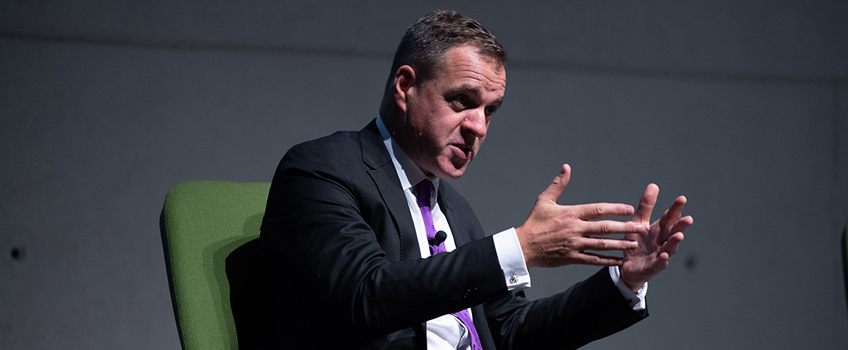Niall Ferguson at ESADE: ‘Facebook ads are the most powerful tools in the history of democracy’
Stanford professor Niall Ferguson analysed the impact of social networks on society, accompanied by ESADEgov lecturer Angel Saz-Carranza. The event was chaired by Koldo Echebarría, ESADE Director General and ESADEgov Professor, and Ana Cebrián, on behalf of the Fundación Rafael del Pino.

April, 08 2019 | Editorial office
Stanford history professor Niall Ferguson analysed the impact of social networks on society during the presentation of his latest book: 'The Square and the Tower'. Ferguson was accompanied by ESADEgov lecturer Angel Saz-Carranza, and was chaired by Koldo Echebarría, ESADE Director General and ESADEgov Professor, and Ana Cebrián, who on behalf of the Fundación Rafael del Pino, expressed the aim of the foundation to increase its presence in Barcelona.
For Niall Ferguson the revolution that led to the creation of the internet and its consequences is only comparable to the impact of the invention of printing in the Middle Ages. However, although both revolutions are based on the ease and speed with which information is disseminated, Ferguson is pessimistic about the impact on society of the domination of internet by a few giants such as Facebook, Google, or Baidu.
Ferguson points out that while the printing business was always decentralised – ‘nobody became a billionaire printing books’ – the internet is controlled by a group of companies that are ‘extremely centralised and hierarchically controlled’. This fact, combined with business models based on advertising, has turned these companies into information managers at the service of their clients, with the consequences that this implies. ‘Brexit and the victory of Trump are examples of the influence of social networks’, said Ferguson. He explained that social networks have existed since the Stone Age (although using other formats and technologies) and offer great potential for explaining such events as the American Revolution, the Enlightenment, or the rise of Nazism from a new perspective. ‘Facebook ads are the most powerful tools in the history of democracy,’ he said – recalling the impact they have had on recent votes.
America and China
Faced with this growing influence, Ferguson highlighted two approaches: that of the American government, which maintains the same deregulation for the technological giants that was applied when they were start-ups; and the Chinese model, that controls the population by controlling content in collaboration with giants like Baidu, Alibaba, or Tencent.
Ferguson is pessimistic about the American model because ‘networks function as polarisation agents, something we can see in pre-war Germany, or before the American Revolution’. He also believes that the Chinese model will fail because of the lack of freedom it implies.
Video summary: https://youtu.be/0jkUTebUNJw






















It is mandatory to be registered to comment
Click here to access.
Click here to register and receive our newsletter.